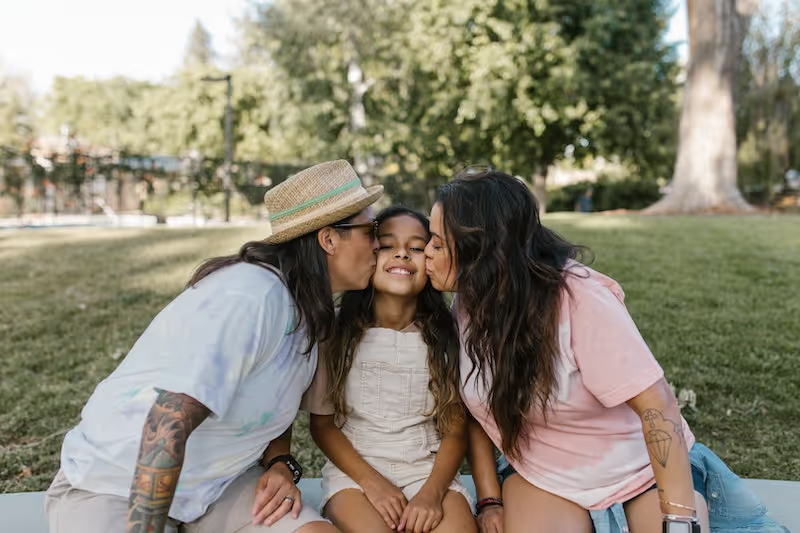It’s no secret that every American adult, regardless of age, income, race, or sexual orientation, should have a valid estate plan. This includes either a last will and testament or a trust, in addition to other important documents, like an advance healthcare directive and financial power of attorney.
Having a legal, up-to-date estate plan allows individuals to have control over who receives their property and looks after their minor children, can reduce the time and cost of the probate process, and shields loved ones from having to make difficult decisions during a time of intense grief. But an estate plan is especially critical for members of marginalized populations — including individuals who identify as part of the LGBTQ+ community.
Estate planning law in the United States is written in a way that prioritizes and benefits “traditional” nuclear families. It often does not accurately reflect the wishes of the diverse and nontraditional families present in America today.
Depending on their situation, LGBTQ+ individuals may have closer relationships with people outside their legal family. But in the absence of valid legal documents stating otherwise, they may find that these legal family members are the ones given legal authority over their finances, medical decisions, funeral arrangements, and children, as opposed to a long-time unmarried partner or trusted friend.
Below, we’ll outline some of the most important estate-planning documents, and explain why they’re even more critical for members of the queer community.
Last will & testament or trust
What is it?
A will is a legal document that explains who should receive an individual’s property (known as their estate) after they pass away. A trust serves a similar purpose.
With a will or trust, an individual can:
- Choose who will inherit their property, money, and other assets after they pass away
- Nominate a guardian for any minor children they may have
- Choose a caretaker for their pets
- Name an executor to carry out the terms of the will, or a successor trustee to carry out the terms of the trust
Why does it matter?
If someone dies without an estate plan (known as dying “intestate”), their estate will be distributed according to arbitrary state laws known as intestacy laws. Intestacy laws prioritize spouses, biological children, and other blood relations above unmarried partners, step-children, or trusted friends.
Traditionally, spouses have significantly more legal authority than domestic partners. And queer individuals couldn’t even benefit from the legal privileges of marriage until 2015, when gay marriage was legalized in the US – less than a decade ago. Those two facts alone make estate planning an area rife with inequality for the LGBTQ+ population.
Unmarried queer individuals — even those in longtime partnerships — don’t receive the same legal benefits and privileges as married couples. If a queer individual is in a relationship with a partner but isn’t married, their partner doesn’t have a right to their property or assets if that individual were to pass away without a legal plan. Instead, assets will pass to the deceased’s next-of-kin following arbitrary state laws known as intestacy laws. Having a valid will or trust ensures the surviving partner isn’t stripped of assets that the deceased intended to share.
Some LGBTQ+ couples in long-term relationships may mistakenly believe their relationship is considered a common law marriage, and thus is protected if one of them were to pass away. A common law marriage is a legally-recognized marriage between two people who haven’t formally had their marriage recognized before the state or church. But the truth is, common law marriages are only recognized in a handful of states (currently Colorado, Iowa, Kansas, Montana, New Hampshire, Oklahoma, Rhode Island, Texas, Utah, and Washington D.C.) — and even in those states, there are restrictions. No individual, LGBTQ+ or otherwise, should bet on common law marriage laws to protect themselves and their partner.
Another extremely important factor to consider is guardianship of minor children. According to US law, only biological or adopted children are considered an individual’s legal children. This does not include stepchildren, foster children, or children that are biologically related to an individual’s spouse or partner, but not the individual. The children in the second group are not automatically entitled to a portion of their caretaker’s property. The caretaker must explicitly name these children as beneficiaries in their estate plan if they want the children to receive anything from their estate.
Conversely, if an individual were to die, their unmarried partner doesn’t have legal rights over any biological children that are the individual’s but not the partner’s. The individual would need to explicitly name their partner as the guardian of their children in their will if they wanted their partner to continue caring for their children.
Even harmonious families with strong relationships have been known to fight over custody of a minor child if the deceased parent neglected to name a guardian. For queer individuals who have closer relationships with their “found family” than they do with their biological one, or strong feelings about how they want their children raised, naming a guardian in their will is of critical importance.
Finally: Individuals with strained relationships with family members have the option to include a “no contest” clause in their will. With a no-contest clause, anyone who challenges a will without good cause is disinherited if their challenge fails — meaning they’ll receive nothing from the will at all.
A no-contest clause can discourage heirs from contesting a will just because they’re not happy with what they receive from it. For LGBTQ+ individuals, this could prevent disgruntled family members from contesting the will if it benefits a romantic partner.

Advance healthcare directive
What is it?
An advance healthcare directive has two parts.
The first is a medical power of attorney, which is a legal document in which an individual nominates someone to make important medical decisions for them if them were to become incapacitated (e.g., were in a coma or diagnosed with dementia).
The second part is a living will, which lets an individual outline their end-of-life healthcare preferences in case they’re unable to communicate them. This could include instructions about whether they’re willing to accept feeding and breathing tubes, what quality of life they want to have, or whether they’re open to experimental or risky medical treatments.
Why does it matter?
Queer individuals may be estranged from family members and don’t want those family members making important decisions about their medical care in the event of incapacity. But if they don’t have an advance healthcare directive, estranged parents or siblings may be the ones who are given legal decision-making rights by default, instead of a trusted partner or friend.
Trans individuals in particular may have strong opinions about the medical care they do or don’t want to receive as it pertains to their gender expression or identity. Outlining this information in a legally-binding advance healthcare directive, and nominating a trusted individual to legally carry out these wishes, is the best way for queer individuals to make sure their wishes are known and followed.
Financial power of attorney
What is it?
A financial power of attorney is a legal document in which the creator gives a chosen individual the legal authority to manage their finances and property in the event they can’t. These tasks could include paying bills, making bank deposits, collecting insurance benefits, and more.
A financial agent may work hand-in-hand with the healthcare agent (or may even be the same person). For example, the healthcare agent may make decisions about which hospital their ward should receive care at or treatments their ward should receive, and the financial agent will ensure these medical bills are paid.
Why does it matter?
There are probably not a lot of people in your life that you’d trust with complete access to your bank accounts, investment portfolio, and tax returns. For queer individuals who have closer relationships with people outside their biological family, this is even more relevant.
That’s why it’s important for queer individuals to be proactive in choosing a financial agent for themselves. If they became incapacitated and did not have a financial POA, then it falls on the government to appoint an agent to manage their finances. And as we’ve seen time and time again, blood relatives are often given preferential treatment, regardless of the state of the relationship.
Financial agents have a fiduciary responsibility, meaning they’re legally obligated to act in the best interest of their ward. Even so, people often behave imperfectly — and for LGBTQ+ individuals, it’s always better not to leave these critical roles to chance.
Funeral arrangements & wishes
What is it?
Funeral arrangements are exactly what they sound like: instructions for how an individual would like their funeral handled. This can include:
- Whether they want to be buried or cremated
- What type of service they prefer
- Where they’d like to be laid to rest
- What they’d like included in their obituary
- Any charities they’d like their loved ones to support in their honor
They can also choose a preferred person they want to carry out their instructions.
Funeral arrangements aren’t technically legally-binding documents, but they’re still an important and helpful part of an individual’s estate plan. It can reduce the emotional toll on loved ones who are in a period of deep grief and may otherwise be overwhelmed by the funeral-planning process.
Why does it matter?
For LGBTQ+ individuals, listing their funeral wishes is a concrete way to express their identity and ensure they’re remembered in the way they want. For individuals who identify as transgender specifically, they may have clear wishes for how they want their gender identity and expression to be respected and maintained.
For a queer individual, naming a funeral agent in their estate plan can be an act of incredible empowerment to marginalized communities.
How FreeWill is closing the gap
FreeWill is on a mission to raise $1 trillion for high-impact nonprofits while democratizing access to critical estate-planning documents for all Americans — specifically those who have traditionally lacked access to estate planning services. Making a legal document on FreeWill has been, and will always be, 100% free for users.
Of the 600,000+ will-makers on FreeWill’s platform, about 1% identify as transgender. According to a 2016 study, 0.58% of the US identifies as trans — and that percentage is higher among younger age groups. So FreeWill trends above the national average when it comes to representing trans individuals.
We continue to make improvements to our products to promote inclusivity for queer individuals. We’ve added nonbinary pronouns to our will-maker, and also added a “preferred name” field, which we use for things like email communication.
Many trans individuals choose to go by a different name than the one they were given at birth — but for many reasons, they may not have legally changed their name. It’s important that they use their legal name on legal documents, like their will, but we ask for their preferred name so we can address them by their chosen name whenever possible.
Having an estate plan gives queer individuals control over their assets, bodily autonomy, and legacy. If queer individuals don’t make a decision, the government will — following arbitrary state laws that may not reflect their wishes or intentions.
Dying without an estate plan deprives queer individuals of their voice in critical decisions about their health, finances, estate, and legacy. Even well-intentioned relatives saddled with this responsibility may not be prepared to make arrangements according to the deceased’s wishes without guidance. This could cause stress, anger, and lasting discord among surviving family members and partners.
The National Resource Center on LGBTQ+ Aging also provides a useful guide on creating end-of-life documents for trans individuals and specific language that the estate planner can consider.
Make your free estate plan today

Make your free advance healthcare directive

Make your free durable power of attorney

Make a stock donation today

Make your free revocable living trust










